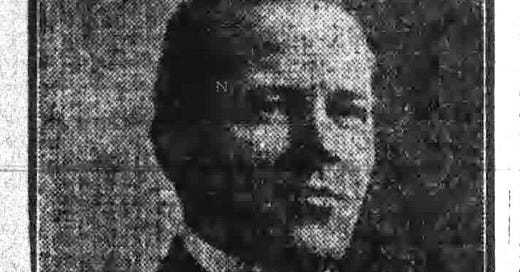Al Bull: The Wyoming Valley's first All-American
Bull, an 1892 graduate of Wyoming Seminary, starred at Penn.
When discussing the immortal football figures hailing from the Wyoming Valley, Alfred E. Bull is the ideal conversation starter. Chronologically, he’s at the forefront of everything and everyone who followed.
Al Bull was born Feb. 5, 1867, in Wilkes-Barre. He attended Wilkes-Barre public schools before transferring to Wyoming Seminary, which preceded his collegiate career at the University of Pennsylvania. At Penn, Bull studied dentistry while captaining the football and crew teams.
“These two types of sports tax the utmost in vitality,” The Times Leader Evening News wrote in Bull’s obituary. “To have won captaincy in both of them indicates the prowess and popularity of the doctor as a student and player.”
In 1895, Bull’s senior year, he was selected an All-American center. Scratch that. He was the nation’s All-American center. There was no second-team selection, just Bull. Since All-America teams were first picked in 1889, Bull was the first selection from the Wyoming Valley. His Penn teammate, Charlie Gelbert, of Hawley, earned the same distinction for Lackawanna County.
Bull helped lead the Penn Quakers to a 14-0 record in 1895. Season highlights included a 17-14 win at Harvard, as well as a streak of 10 — yes, 10 — consecutive shutouts. The Quakers were national champions, one of seven national titles claimed by Penn.
Football in the 1890s was a brutal and occasionally lethal game in which the forward pass was illegal and the ball was moved with brute strength. Many players along the line were 200-plus pounds, but Bull weighed a mere 170 pounds, making his success all the more impressive.
After graduation, Bull coached the University of Iowa’s football team for one season in 1896. He led the Hawkeyes to a 7-1-1 mark with shutout wins against the likes of Kansas, Missouri and Nebraska. After head coaching stints at Franklin & Marshall and Georgetown, Bull from 1903-07 coached Lafayette, where his teams had a 37-10-3 record. One of those three ties was one of Lafayette’s great triumphs, a 6-6 tie at Penn in 1905; Penn finished 12-0-1 and was perhaps denied the national title because of that lone blemish.
Following a three-year term at Muhlenburg, Bull retired with a career 62-34-15 record. Pairing his coaching success with his All-American, national championship-winning playing career, one would think Bull’s resume is enough for induction into the College Football Hall of Fame. However, Bull never made it. Out of the 11 All-Americans in 1895, Bull is one of four not in the HOF.
When Bull, 63, died in 1930, he was remembered in the press as an exceptional athlete and dentist.
An obituary stated, “Penn fans will always remember him as the small center with the wallop of a giant.”




